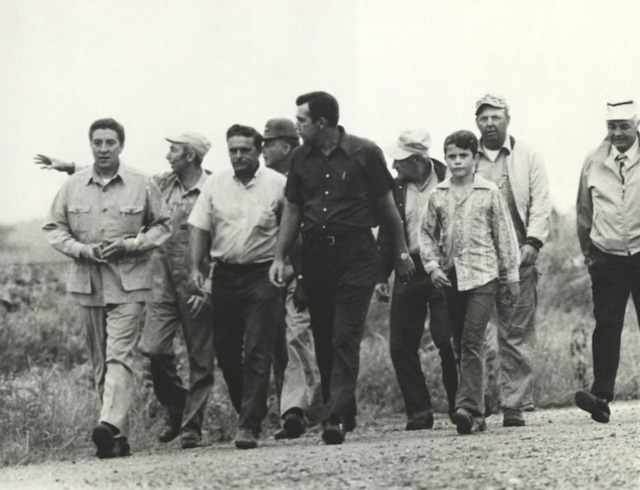
Dick Clark walked more than 1,500 miles across Iowa during his 1972 campaign for the U.S. Senate. Photos courtesy of the Richard Clark Collection at the University of Iowa Special Collections
Sept/Oct 2022 (Volume 14, Issue 5)
By Jerry Harrington
Fifty years ago, a private citizen spent much of 1972 walking the rural and urban byways of Iowa, meeting people, shaking hands and listening to concerns of fellow voters. Greeting Iowan after Iowan one-on-one, Dick Clark claimed that “government had forgotten to listen to its citizens” and he meant to change that.
Clark’s goal was to win Iowa’s U.S. Senate seat against a seemingly entrenched two-term incumbent. Against overwhelming odds, that is exactly what he did. In doing so, he overturned conventional political wisdom and stunned the nation.
Democrat Clark’s win over Republican U.S. Sen. Jack Miller in 1972 is a David-versus-Goliath tale, made especially remarkable since it happened the same year Republicans President Richard Nixon and Gov. Robert Ray won handily in Iowa, Nixon by 210,000 votes and Ray by 219,000. Clark’s walk — as well as his shrewd organizational skills — made this win possible.
Dick Clark had never been elected to public office before 1972. A Linn County native from the small Iowa town of Paris (population: 35), Clark graduated from Lamont High School in 1947 and served in the military in Europe during the Korean War. Attending the University of Iowa under the GI Bill, Clark studied history, where he worked toward his Ph.D.
He began teaching history at Upper Iowa College in Fayette, where he became involved in local politics. As a Democratic Party volunteer, he worked to collect names, addresses and phone numbers of party members with the goal of contacting them on election day to get them to the polls. This resulted in Democratic victories in an otherwise Republican area.
This caught the eye of attorney John Culver of Cedar Rapids, who was seriously thinking of running for Congress in 1964. Culver recruited the young college professor into his campaign to apply his organizational skills to the congressional district level and, when he won, Culver asked Clark to be his administrative assistant in Washington, D.C.
The pair led an effort to modernize the Iowa Democratic organization, then lagging behind modern grassroots political engagement. Volunteers collected names and information on tens of thousands of registered voters; this was followed by election-day calls to these supporters. As this advanced, the program — called VIP (Voter Identification Profile) — moved from cards with names and numbers written in pencil in shoe boxes to more sophisticated computerized printouts.
After winning the eastern Iowa congressional seat several times, Culver considered running for the U.S. Senate in 1972. He asked Clark to return to Iowa to build a statewide organization for the upcoming election. This Clark did, moving himself and his family to Marion, making political contacts throughout Iowa to create a campaign network for Culver.
Then Culver hesitated. He concluded the task of defeating incumbent Sen. Jack Miller seemed insurmountable. A tax attorney from Sioux City, Miller was first elected in 1960 and re-elected in 1966 by carrying all of Iowa’s 99 counties. A conservative, Miller seemed well on his way to a third term in traditionally Republican Iowa.
Culver decided he stood a better chance of continuing his political career by running for his old congressional seat and opted against challenging Miller for the Senate seat.
That left no one of prominence among Iowa Democrats to run for the U.S. Senate in 1972. Buoyed by a statewide organization he helped create, the 43-year-old Clark decided to run for the Senate himself.
TO READ THE ENTIRE STORY AND OTHER FASCINATING STORIES ABOUT IOWA HISTORY, subscribe to Iowa History Journal.
